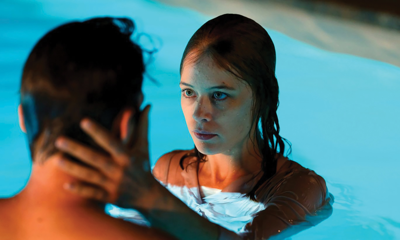
German director Christian Petzold’s Undine is a slippery film. Haunted by a German past that the film talks about at great length — as if trying to psychoanalyze Berlin’s state of mind — it feels unsure of its relationship to the present. It plays like a sister to Petzold’s 2007 film Yella, which took place in a liminal state where East Germany’s introduction to capitalism and democracy were actually death throes rather than a promising integration into the larger country. Like Yella, Undine introduces an element of fantasy to its story.
The film’s title refers to a mythological water sprite, first cited by physician and alchemist Paracelsus in a text published in 1566, decades after his death. This being can walk on dry land and pass for a woman, but if her attempts to earn an immortal soul through marriage to a human fail, she heads back to her home in the sea. The idea of the undine has been written about by Oscar Wilde, Hans Christian Andersen and opera composer E.T.A. Hoffmann, among others, and Neil Jordan’s 2009 film Ondine saw Colin Farrell encounter one in Ireland.
As Undine begins, Undine Wibeau (Paula Beer) is happily living in Berlin and working at the City Museum. But the rules of her existence among humans have been shattered. Her lover Johannes (Jacob Matschenz) has cheated on her — she tells him, “If you leave me, I’ll have to kill you.” She soon meets a much nicer man, Christoph (Franz Rogowski), who works as a diver in Wuppertal, where he encounters a giant catfish underwater. They develop a sweet relationship, and one of their dates consists of diving together. But the demands of life as an undine are not quite the same as those of a human, and Christoph eventually tests those bonds.
Undine — which was completed and debuted last year — documents Berlin as it experienced the 30th anniversary of its reunification. For a paranormal creature, Undine’s day job is rather material, even dry. She gives lectures to visitors about the history of Berlin, walking around a room full of scale models of the city. Writing about the significance of the character’s identity combined with her work as a historian, Michael Sicinski writes, “On the surface, the wall split the city, but underground, at the core, there remained unity — one that a sea creature could experience in a way surface creatures could not.” The city feels devoid of solid ground, like the impossible house in Dario Argento’s Inferno whose cellar is a vast lake.
Petzold’s work has synthesized his two biggest influences: the leftist documentaries of Harun Farocki and American genre films. Farocki’s cool, observational 2004 film Nothing Ventured, about venture capitalists, directly inspired Yella. Petzold’s very early made-for-TV films even hint at the ambitious sleaze of Brian De Palma and Paul Verhoeven, although he doesn’t have their relish for sex and violence. But the idea that there’s something ghostly about German life lingers behind much of Petzold’s work — like Transit, which adapted a 1944 novel about a Jewish refugee to be set in present-day Europe.
Undine is a much more romantic film, but its mixture of the real and the fanciful takes a while to gel. Is it meant as a joke when Undine and Christoph don’t get around to having sex because she spends minutes talking about Berlin’s history? Petzold depicts their physical affection very well, but he holds back. He frequently returns to the image of an aquarium being smashed, a symbol of the couple’s passion and Undine’s connection to water. Rogowski really brings out Christoph’s tenderness and vulnerability, especially compared to Johannes.
Instead of being allusive in a productive way, Undine sometimes feels like a metaphor for the conditions of ordinary German women — but for the most part, it doesn’t gain anything from using water sprites as allegory. The film wants to explore a life-changing romance but keeps passion at arm’s length, repressed by an arbitrary set of rules about what Undine and Christoph can do. It’s trying to be much more than a love story, but the baggage doesn’t fully cohere. Like its heroine, Undine is stuck between land and sea.





